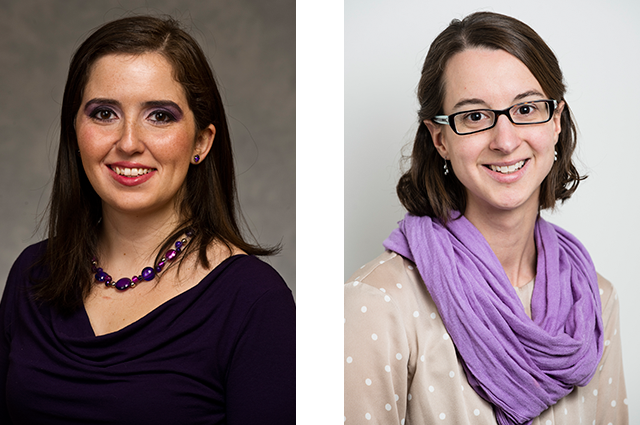Asatekin and Wendell named endowed assistant professors

On September 1, 2016, Assistant Professors Ayse Asatekin and Kristen Wendell were appointed to endowed professorships in recognition of their outstanding research programs and potential.
Asatekin, assistant professor in the Department of Chemical and Biological Engineering, was named the John A. and Dorothy M. Adams Faculty Development Professor. Asatekin received her Ph.D. in chemical engineering with a concentration in polymer science and technology in 2009 from MIT, where she was awarded the Materials Research Society's Graduate Student Gold Award. She is also the co-founder and scientific advisor of Clean Membranes, Inc., a start-up company that will commercialize her polyacrylonitrile-based membrane technology that she began developing during her doctoral research.
Astekin directs the Smart Polymers, Membranes and Separations Laboratory, which aims to develop the next generation of membranes to generate clean, safe water more efficiently, and separate chemicals with lower energy use. These membranes rely on polymers that self-assemble, form nanostructures, and expose chemical functionalities that enable them to perform functions normally not expected from membranes, including: reaction to stimuli; removal of not only bacteria but also heavy metals; and separation of small molecules by chemical structure. Asatekin recently received a five-year $500,000 early career award from the National Science Foundation (NSF) for her research, which will lead to the development of improved membranes for separations underserved by existing technologies, such as peptide separations and textile wastewater treatment.
The John A. and Dorothy M. Adams Faculty Development Professorship was created to recruit and retain outstanding junior faculty members with a gift from the estate of Dorothy Adams in honor of her husband, John A. Adams, E39, who graduated from Tufts with a degree in electrical engineering.
Wendell, assistant professor of mechanical engineering and adjunct assistant professor of education, was named the McDonnell Family Professor in Engineering Education. Wendell earned her Ph.D. in science education from Tufts University and her M.S. in aeronautics and astronautics from MIT. She received a B.S. in mechanical and aerospace engineering from Princeton University.
She was recently named a recipient of a Presidential Early Career Award for Scientists and Engineers (PECASE), the highest U.S.-sponsored honor given to science and engineering professionals in the early stages of their independent research careers. President Barack Obama named 106 researchers as recipients of this award. Of the 106 PECASE awardees, 21 — including Wendell — were nominated by the National Science Foundation (NSF). Awardees are selected on the basis of two criteria: pursuit of innovative research at the frontiers of science and technology, and a commitment to community service as demonstrated through scientific leadership, public education, or community outreach.
Wendell received a five-year $600,000 NSF early career award for her research project aimed at developing, implementing, and assessing a model that introduces novice elementary school teachers (grades one through six) to community-based engineering design as a strategy for teaching and learning in urban schools. This project aims to explore how teachers' engineering design abilities and understanding of engineering and scientific processes evolve during community-based engineering experiences, and determine if participating in extended professional development on community-based engineering has an impact on the teachers.
The McDonnell Family Professorship in Engineering Education was created through the generosity of the McDonnell Family Foundation, as part of a larger gift made in support of the Center for Engineering Education and Outreach (CEEO). The foundation—established by relatives of James S. McDonnell, aviation pioneer and founder of McDonnell Aircraft Corporation—is committed to supporting education reform and innovation. Their gift was inspired by the cutting-edge, interdisciplinary work produced by the members of the CEEO as well as the foundation's belief that the CEEO can serve as a change agent for engineering education both at Tufts and in K–12 classrooms nationally.
Department:
Chemical and Biological Engineering